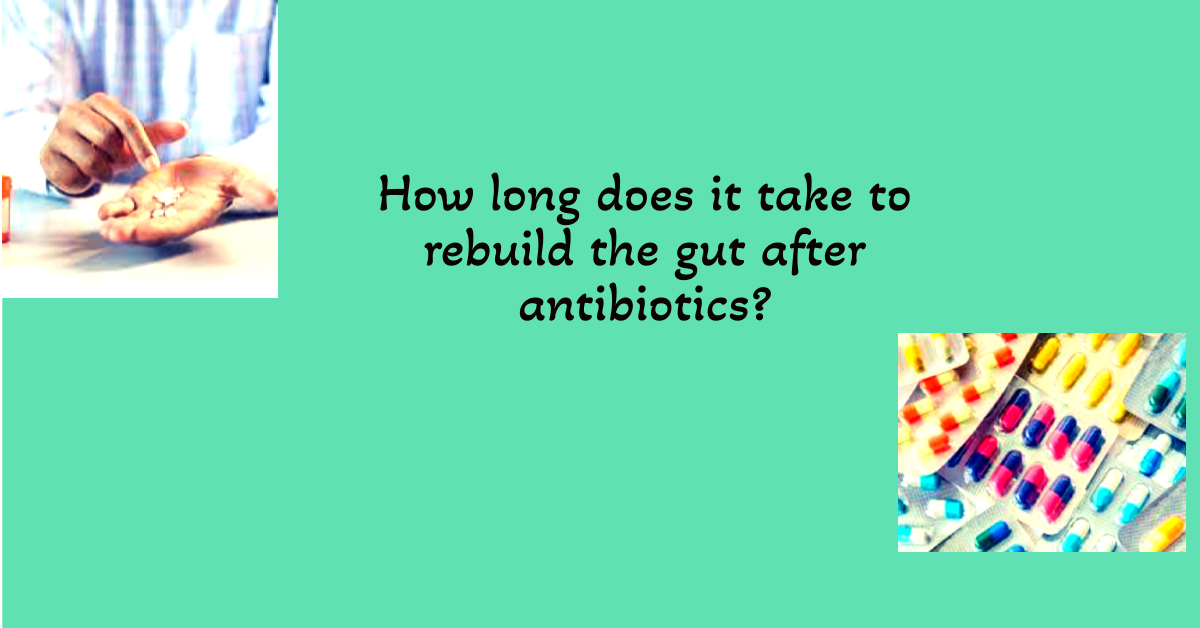How long does it take to rebuild the gut after antibiotics?A Complete Guide to Recovery Antibiotics are a vital part of modern medicine, used to treat infections and save lives. However, while they effectively target harmful bacteria, antibiotics can also disrupt the balance of good bacteria in the gut. This disruption can lead to digestive issues and other health problems, leaving many people wondering: How long does it take to rebuild the gut after antibiotics? In this article, we will explore the timeline for gut recovery after antibiotic use, the factors that influence this process, and strategies to speed up healing.

What Happens to Your Gut After Taking Antibiotics?
To understand how long it takes to rebuild the gut after antibiotics, it’s essential to first recognize what happens to your digestive system when you take these medications. Antibiotics, particularly broad-spectrum ones, work by killing bacteria—both harmful and beneficial. While they eliminate the harmful bacteria causing an infection, they can also disrupt the natural microbiome, which is the collection of beneficial bacteria living in your gut.
When antibiotics kill off a significant portion of good bacteria, it can lead to an imbalance known as dysbiosis. This imbalance may result in digestive issues such as bloating, diarrhea, constipation, and even an overgrowth of harmful bacteria like Clostridium difficile, which can cause severe infections. This disruption can weaken your immune system and lead to long-term health consequences if the gut is not properly restored.
How Long Does It Take to Rebuild the Gut After Antibiotics?
The time it takes to rebuild your gut after antibiotics can vary widely depending on several factors, including the type of antibiotic used, the duration of treatment, and your overall health. On average, it can take anywhere from a few weeks to several months for the gut microbiome to fully recover. However, some studies suggest that it could take up to a year or longer for the microbiome to fully return to its pre-antibiotic state, particularly after prolonged or frequent use of antibiotics.
Key Factors Influencing Gut Recovery
Several factors can influence how long it takes to rebuild the gut after antibiotics. These factors include:
- The Type of Antibiotic
Not all antibiotics have the same effect on the gut. Broad-spectrum antibiotics, which target a wide range of bacteria, are more likely to cause significant disruptions to the gut microbiome. On the other hand, narrow-spectrum antibiotics, which target specific bacteria, tend to have a lesser impact. The stronger and more prolonged the antibiotic treatment, the longer it may take for the gut to recover. - Duration of Antibiotic Use
The length of time you use antibiotics also plays a role in how quickly your gut recovers. Short-term antibiotic treatments (a few days or weeks) may cause less damage to the gut microbiome than long-term treatments. However, even short courses of antibiotics can disrupt the gut, especially if they are taken frequently. - Your Diet and Lifestyle
Your diet and lifestyle habits can significantly impact how quickly your gut recovers. A diet high in fiber, prebiotics, and probiotics can support the growth of beneficial bacteria and promote a healthy microbiome. Additionally, stress, lack of sleep, and sedentary behavior can negatively affect gut health and slow down the recovery process. - Your Age and Overall Health
Age and general health also influence how long it takes to rebuild the gut after antibiotics. Younger individuals and those with a healthy immune system may experience quicker recovery times. In contrast, older adults or individuals with compromised immune systems may face a longer healing process.
Signs Your Gut Is Recovering After Antibiotics
It can be difficult to know exactly when your gut has fully recovered, but there are several signs that your digestive system is on the mend after taking antibiotics. These signs include:
- Improved Digestion
As the gut microbiome rebuilds, you should start to notice fewer digestive issues such as bloating, gas, or irregular bowel movements. A healthy gut will process food more efficiently, leading to better nutrient absorption and fewer digestive complaints. - Better Immune Function
Since much of your immune system is housed in your gut, a healthy microbiome is essential for optimal immune function. If you notice fewer colds, infections, or overall fatigue, it could be a sign that your gut is recovering. - Increased Energy Levels
A healthy gut microbiome is essential for producing certain vitamins and short-chain fatty acids that are crucial for overall energy. As your gut heals, you may notice an increase in energy and a reduction in feelings of sluggishness or fatigue. - Improved Skin Health
Gut health and skin health are closely linked. An imbalance in gut bacteria can lead to conditions like acne, eczema, and rosacea. As your gut microbiome rebuilds, you may notice improvements in your skin.
Tips to Help Rebuild Your Gut After Antibiotics
If you want to speed up the process of rebuilding your gut after antibiotics, there are several strategies you can implement to help restore balance to your microbiome:
- Consume Probiotics
Probiotics are live bacteria that can help replenish the beneficial bacteria in your gut. Foods like yogurt, kefir, sauerkraut, and kimchi are natural sources of probiotics. Alternatively, you can take probiotic supplements. Look for strains such as Lactobacillus and Bifidobacterium, which are commonly found to be helpful in promoting gut health. - Eat Prebiotic Foods
Prebiotics are non-digestible fibers that feed the beneficial bacteria in your gut. Including prebiotic-rich foods in your diet, such as garlic, onions, leeks, asparagus, and bananas, can help encourage the growth of healthy bacteria. - Follow a Balanced Diet
A diet high in fiber, fruits, vegetables, and whole grains is essential for gut health. Fiber-rich foods provide the necessary nutrients to help feed the good bacteria in your gut, promoting a healthy microbiome. - Stay Hydrated
Drinking plenty of water is essential for digestion and overall gut health. Proper hydration supports the movement of food through the digestive tract, aids in nutrient absorption, and helps prevent constipation. - Limit Stress
Chronic stress can negatively affect the gut microbiome and delay the recovery process. Practice stress-reducing techniques such as meditation, yoga, deep breathing, or spending time in nature to support gut healing. - Get Enough Sleep
Sleep is essential for overall health and well-being, including gut health. Aim for 7-9 hours of quality sleep each night to support the recovery of your gut microbiome. - Avoid Unnecessary Antibiotic Use
To prevent further disruption to your gut microbiome, it’s important to avoid taking antibiotics unless absolutely necessary. Always follow your healthcare provider’s instructions and only use antibiotics as prescribed.
Conclusion: Be Patient and Support Your Gut Health
Rebuilding your gut after antibiotics is a gradual process, and the time it takes can vary from person to person. While some people may notice improvements in just a few weeks, it can take several months for the gut microbiome to fully recover, especially after long-term antibiotic use. By following a healthy diet, staying hydrated, managing stress, and supporting your gut with probiotics and prebiotics, you can help accelerate the healing process.
Remember, it’s important to be patient. With the right care and attention, your gut can bounce back from the effects of antibiotics and restore its natural balance, promoting better digestion, immune health, and overall well-being.

